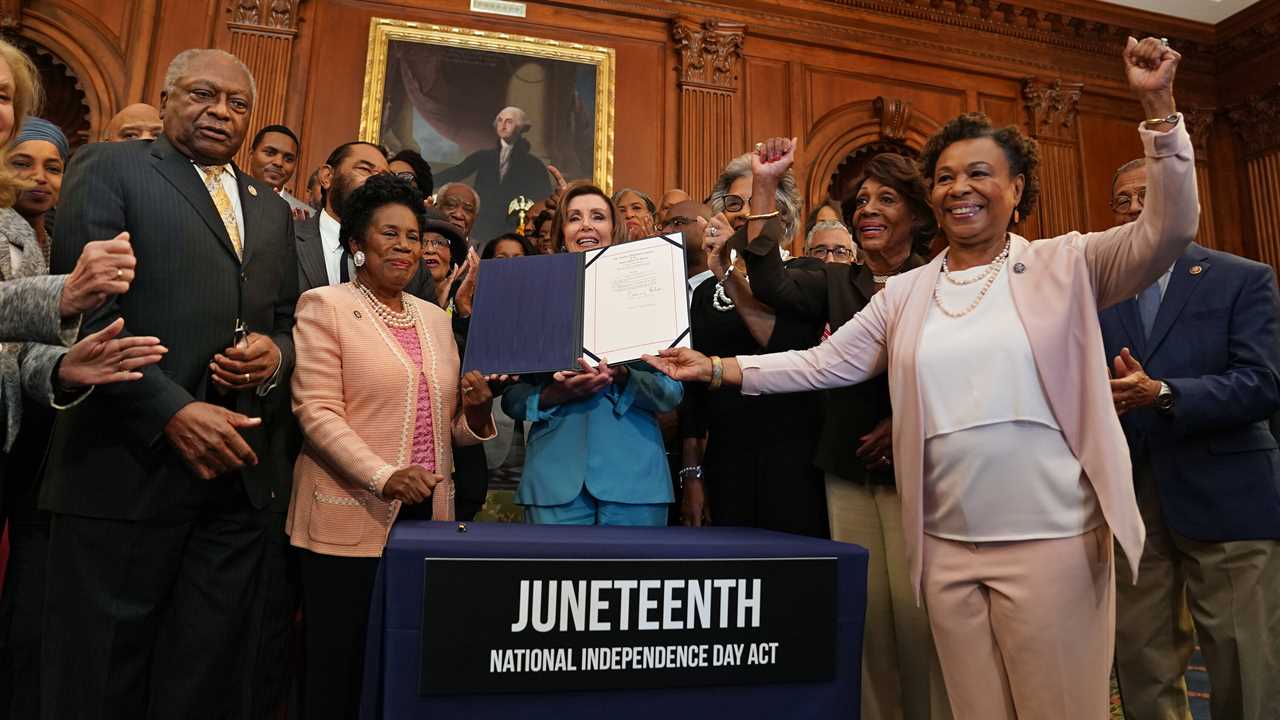
When the House of Representatives voted overwhelmingly on Wednesday to make Juneteenth a federal holiday, a day after the Senate rushed the measure through unanimously, 14 House members, all Republicans, voted against the proposal.
President Biden is expected to sign the measure into law on Thursday afternoon.
Juneteenth celebrates the events of June 19, 1865, when Maj. Gen. Gordon Granger informed enslaved African Americans in Galveston, Texas, that the Civil War had ended and that they were free. Texas was the first state to recognize Juneteenth as a holiday, in 1980.
“Juneteenth is as significant to African Americans as July 4 is to all Americans,” Representative Sheila Jackson Lee, Democrat of Texas and a lead sponsor of the bill, said in a statement.
Juneteenth would be the 11th national holiday to be recognized by the federal government. The last one was Martin Luther King Jr. Day, which was first proposed shortly after he was assassinated in 1968 and approved by Congress in 1983. (Martin Luther King Jr. Day was first observed as a federal holiday in 1986.)
Here are the 14 Republican representatives who voted against making Juneteenth a federal holiday.
Mo Brooks
Mr. Brooks has represented parts of northern Alabama, including Huntsville, since 2011. He told AL.com on Wednesday that the bill “should have been celebrating the Emancipation Proclamation or the passage of the 13th, 14th or 15th Amendments or the end of the Civil War.”
Andy Biggs
Mr. Biggs has represented an Arizona district since 2017 that includes parts of Maricopa County, east of Phoenix. In a video posted on Twitter on Wednesday, he said he would have voted for the Juneteenth bill, whose formal name is the Juneteenth National Independence Day Act, if Democrats had changed the holiday’s name to “Juneteenth National Emancipation Day.”
“They weaponize this bill like they weaponize everything else,” Mr. Biggs said.
Andrew Clyde
Mr. Clyde has represented a largely rural district in northeastern Georgia since January. His office did not respond to a request for comment. He has said he supported a Juneteenth holiday but objected to the use of the phrase “Independence Day” in its name, according to The Atlanta Journal-Constitution.
Scott DesJarlais
Mr. DesJarlais has represented parts of southern Tennessee since 2011. He said in a statement on Wednesday that “he believes it is fiscally irresponsible to continue to create new paid holidays for federal workers while the majority of hard-working private-sector employees get left to pay the bill.”
Paul Gosar
Mr. Gosar, who has represented parts of western Arizona since 2013, said in a statement on Wednesday that “Juneteenth is more debunked Critical Race Theory in action.”
Ronny Jackson
Dr. Jackson, a former White House physician, has represented parts of northern Texas since January. “I support Texas’ Juneteenth holiday and I support all Americans who celebrate it,” he said in a statement on Thursday. “However, I do not support more days off for federal employees.”
Doug LaMalfa
Mr. LaMalfa has represented rural northeastern California since 2013. His office did not respond to a request for comment.
Thomas Massie
Mr. Massie has represented parts of northeastern Kentucky since 2012. “Naming this day ‘National Independence Day’ would create confusion and push Americans to pick one of those two days as their independence day based on their racial identity,” Mr. Massie said on the House floor on Wednesday.
Tom McClintock
Mr. McClintock’s California district, which he has represented since 2009, includes the west shore of Lake Tahoe and Yosemite National Park. “I don’t believe it’s healthy to reach into the dead past, revive its most malevolent conflicts and reintroduce them into our age,” he said in a statement on Thursday.
Ralph Norman
Mr. Norman has represented a largely rural district in South Carolina that borders North Carolina since 2017. Mr. Norman estimated on Twitter on Wednesday that it would cost the federal government more than a billion dollars a year if Juneteenth were made a federal holiday. He also objected to the holiday’s name. “If you want to call Juneteenth, for example, Freedom Day or Emancipation Day then fine,” Mr. Norman said. “But calling it Independence Day,” he added, was inappropriate.
Mike Rogers
Mr. Rogers has represented a district in eastern Alabama since 2003. His office did not respond to a request for comment.
Matt Rosendale
Mr. Rosendale has been Montana’s only congressional representative since last year. “This isn’t an effort to commemorate emancipation, it’s very clearly tied to the larger hard-left agenda to enshrine the racial history of this country as the prime aspect of our national story,” Mr. Rosendale said in a statement on Wednesday.
Chip Roy
Since 2019, Mr. Roy has represented a district in South Texas that includes parts of Austin and San Antonio. He said in a statement on Wednesday that the official name of the Juneteenth holiday “needlessly divides our nation on a matter that should instead bring us together by creating a separate Independence Day based on the color of one’s skin.”
Tom Tiffany
Mr. Tiffany has represented a district in northern and central Wisconsin since last year. He told WQOW-TV in a statement that House Democrats had “used their majority to balkanize our country and fuel separatism by creating a race-based ‘Independence Day.’”






